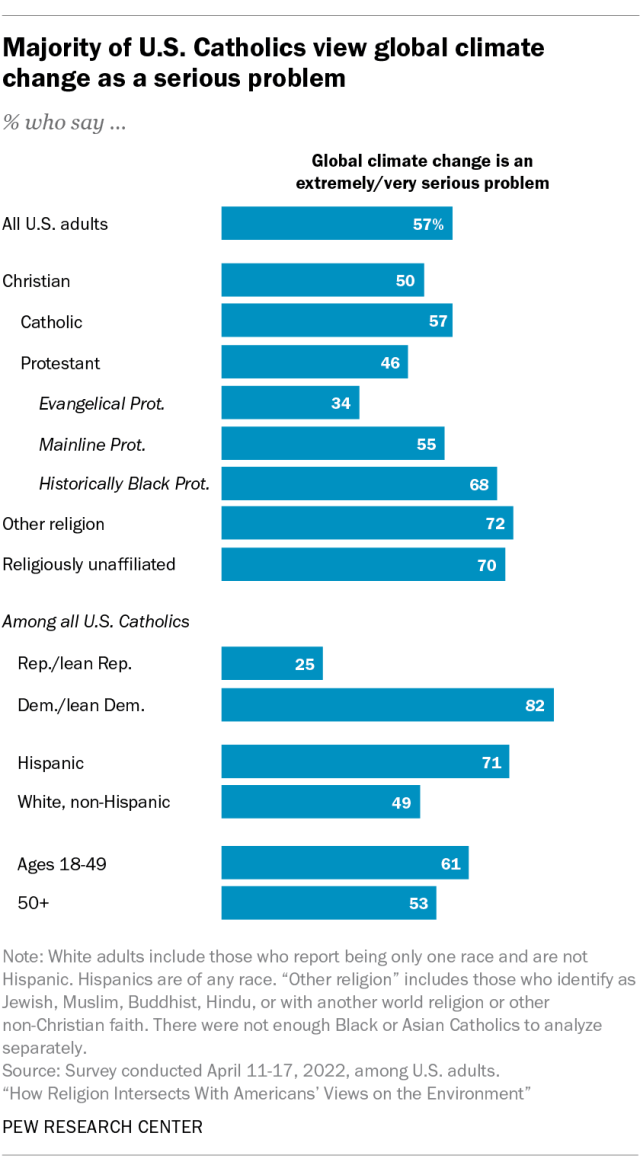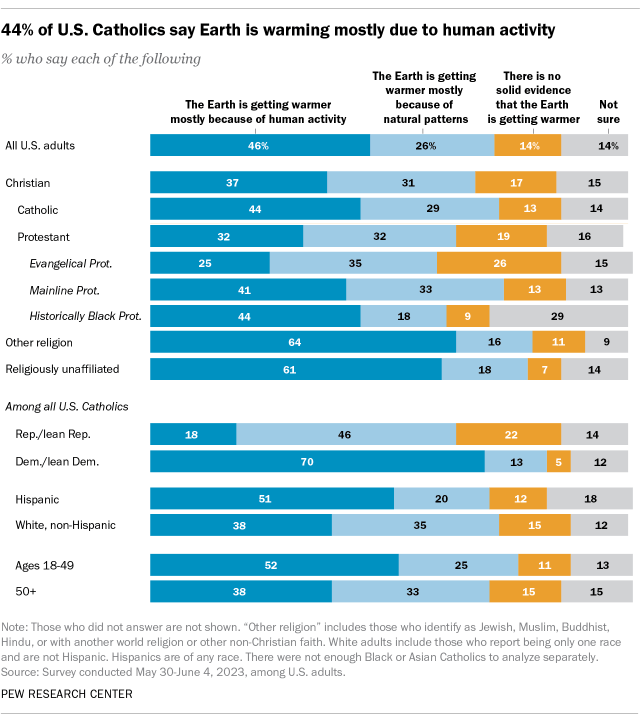
Pope Francis has frequently spoken about climate change during his decade-long leadership of the Roman Catholic Church. In 2015, he devoted an entire encyclical to the matter, citing scientific consensus that the Earth is warming due to human activity. And next week, he is expected to release a new document that he said will “address current problems” related to climate issues.
This analysis is based on data from two separate Pew Research Center surveys, one from 2022 and one from 2023.
The 2022 survey was part of a wider study of the relationship between Americans’ religious beliefs and their views about the environment. This survey, conducted April 11-17, 2022, included 10,156 U.S. adults. All respondents were part of Pew Research Center’s American Trends Panel (ATP), an online survey panel that is recruited through national random sampling of residential addresses. This way nearly all U.S. adults have a chance of selection. The survey was weighted to be representative of the U.S. adult population by gender, race and ethnicity, partisan affiliation, education, religious affiliation and other categories. For more, read the ATP’s methodology.
The 2023 survey was part of a Center study to understand Americans’ views of climate, energy and environmental issues. It was conducted from May 30 to June 3, 2023, among 10,329 U.S. adults who are part of the ATP.
Despite Francis’ years of outspokenness on the subject, not all Catholics in the United States share his concerns, according to a 2022 Pew Research Center survey. For example, views vary by:
- Party: 82% of Catholics who are Democrats or lean toward the Democratic Party say global climate change is an extremely or very serious problem, while just a quarter of Republican and Republican-leaning Catholics say the same.
- Race and ethnicity: 71% of Hispanic Catholics see climate change as an extremely or very serious problem, compared with 49% of White, non-Hispanic Catholics. (There were not enough Black or Asian Catholics in the 2022 survey to analyze separately.)
- Age: Catholics ages 18 to 49 are somewhat more likely than those ages 50 and older to express a high level of concern about climate change (61% vs. 53%).
Broadly speaking, Catholics are no more likely than Americans overall to view climate change as a serious problem. An identical share in each group say global climate change is either an extremely or very serious problem (57%).

But views among Catholics differ, reflecting similar splits in the wider American population. U.S. adults overall who are 49 or younger, Democratic, or identify as a race or ethnicity other than non-Hispanic White are generally more likely than those who are 50 or older, Republican, or non-Hispanic White to express concern about climate change.
Among U.S. adults overall, opinion about climate change is strongly tied to political partisanship. Democrats and Democratic leaners are far more likely than Republicans and Republican leaners to say that global climate change is an extremely or very serious problem (83% vs. 25%). This gap underlies much of the apparent differences in views among religious groups, including Catholics. Generally speaking, U.S. Catholics are politically evenly divided. But Catholics who are non-Hispanic White or who are older are far more likely than those who are Hispanic or younger to be Republican.
Partisan and demographic differences in Catholics’ views of climate change extend to other environment-related topics, too. For example, 44% of Catholics say the Earth is warming mostly due to human activity – in line with the pope’s stance, according to a separate Center survey from June. About three-in-ten (29%) say it is warming mostly due to natural patterns, while 13% say there is no solid evidence the planet is getting warmer. Catholics who are Democratic, younger or Hispanic are more likely than those who are Republican, older or non-Hispanic White to say the Earth is mostly warming due to human activity.

How often Catholics hear about climate issues in sermons
In addition to asking Americans about their own views on climate change, the 2022 Center survey asked respondents how much they hear about the topic in sermons.
Among those who attend religious services at least monthly, U.S. Catholics indicate that climate change is not discussed frequently from the pulpit. About one-in-ten (8%) say there is a great deal or quite a bit of discussion on climate change in sermons, while 50% say there is either some or a little discussion of it. About four-in-ten (41%) regular Mass attenders say there is no discussion of climate change.
Overall, then, 58% of Catholics who attend services at least monthly say there is at least a little discussion of climate change in sermons.
Among Catholics who attend Mass at least monthly, 36% say they have heard at least a little about climate change in sermons and that those sermons always or often express the view that “we have a duty to care for God’s creation.” Smaller shares say sermons at their congregation always or often express “support for actions to limit the effects of climate change” (23%); “concern that policies aimed at reducing climate change give too much power to the government” (9%); or “the view that we don’t need to worry about climate change” (8%).
Note: This is an update to a post originally published Feb. 9, 2023.
